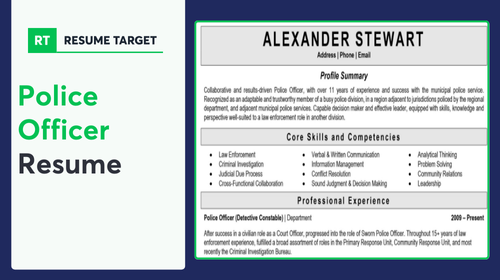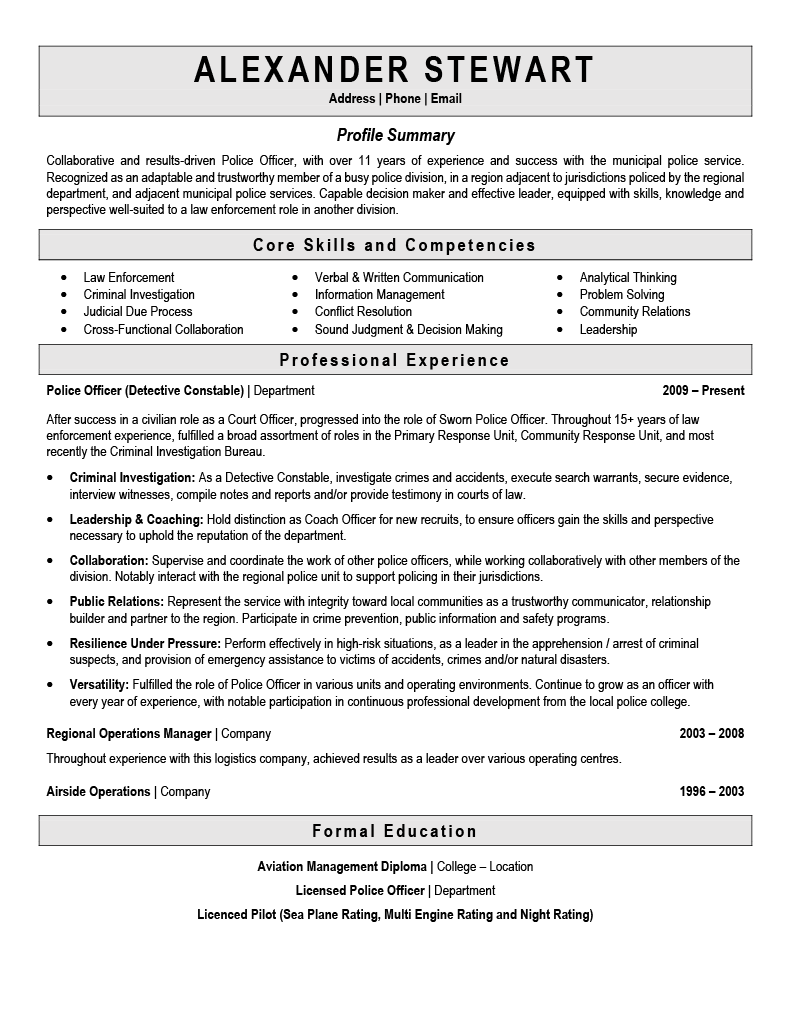

Behind the badge lies a unique challenge - translating life-saving work and public service into compelling resume content. Most police officers struggle to describe their daily duties in a way that truly captures their impact and value.
Are you finding it difficult to showcase your law enforcement achievements on paper? Your resume needs to do more than list arrests and patrols - it must demonstrate your leadership, judgment, and commitment to public safety.
Resume Target specializes in helping police officers transform their service records into powerful career documents. We know how to present your experience in a way that highlights both your tactical skills and your role in building safer communities.

As society's first line of defense, police officers do far more than enforce laws - they serve as peacekeepers, emergency responders, and community guardians who handle over emergency and non-emergency calls while protecting lives and property in their jurisdictions.
Your daily duties would span from conducting routine patrols and traffic stops to investigating crimes, collecting evidence, and preparing detailed reports that could make or break a court case - all while maintaining the split-second decision-making abilities that keep communities safe.
Whether you're drawn to patrol work, investigations, or specialized units like K-9 or SWAT, a career in law enforcement offers diverse advancement opportunities as you gain experience and additional training, potentially moving up through the ranks from officer to sergeant, lieutenant, or beyond.
Let's talk about your earning potential as a Police Officer! Your career in law enforcement offers compelling compensation that grows significantly with experience and location. And guess what? If you're considering specializing as a detective or criminal investigator, you'll find even more rewarding financial opportunities, especially in states known for competitive salaries like California, New York, and Washington.
Figures from: All Criminal Justice Schools
Police officers can advance through ranks from patrol officer to leadership positions through proven performance and passing promotional exams. Career growth includes opportunities to specialize in areas like detective work or community policing.
Beyond basic law enforcement abilities, advancing your police career requires mastering both technical expertise and advanced interpersonal capabilities that demonstrate your leadership potential.
- Situational Assessment and Decision Making - Advanced Communication and Report Writing - Vehicle Operation and Pursuit Techniques - Cultural Competency and Community RelationsTo become a police officer, you'll need at least a high school diploma, U.S. citizenship, and successful completion of both police academy training and rigorous physical and written tests.
Your success as a police officer will depend heavily on developing strong interpersonal and public relations skills, along with the ability to assess situations quickly and maintain composure under pressure.
From bustling California cities to the nation's capital, police departments across the US are actively recruiting officers.
Figures from GI Jobs
Struggling to translate your law enforcement experience, training certifications, and public service achievements into a compelling police officer resume that stands out to department recruiters? This comprehensive, section-by-section guide will show you exactly how to highlight your qualifications and craft a professional resume that gets results.
As a police officer who protects and serves your community daily, crafting the perfect resume summary might feel more challenging than handling a difficult patrol situation.
While you excel at maintaining public safety, defusing tense situations, and enforcing laws, translating these critical skills into a compelling written summary can be tricky - yet it's essential for helping hiring managers quickly recognize your potential as their next law enforcement professional.
How would you characterize your overall approach to law enforcement and community policing across your career?
Reason: This helps establish your policing philosophy and values upfront, giving hiring departments insight into how you'll fit their culture and community relations goals.
What combination of law enforcement specialties and certifications best defines your professional identity as an officer?
Reason: This question helps you identify your most marketable professional qualities and expertise areas, allowing you to craft a summary that immediately positions your unique value to the department.
How would you describe your ability to balance the enforcement of laws with community service and public safety across your career?
Reason: This helps articulate your understanding of modern policing's dual role - highlighting both your commitment to upholding the law and serving the community, which is crucial for today's law enforcement positions.
As a police officer, your skills section needs to demonstrate both your law enforcement expertise and your ability to serve the community effectively.
From tactical abilities like firearms proficiency and emergency response to interpersonal skills like conflict de-escalation and community relations, your resume should showcase the full spectrum of capabilities that make you an effective law enforcement professional.
Showcase your law enforcement career by organizing your experience into three powerful sections: a concise role overview highlighting your jurisdiction and specialties, measurable achievements that demonstrate your impact on public safety, and core responsibilities that reflect your commitment to protect and serve.
Many police officers struggle to translate their daily patrol activities and emergency responses into compelling career achievements that resonate with hiring departments. Transform your day-to-day duties into powerful success stories by connecting your actions to specific crime reduction rates, community impact metrics, and departmental efficiency improvements.
The responsibilities section demonstrates how Police Officers protect and serve their communities beyond basic patrol duties. This section must translate law enforcement activities into clear achievements that hiring managers can understand, showing how your daily work contributes to public safety and community well-being.
As a Police Officer, your law enforcement credentials and specialized training certifications are crucial elements of your resume. Lead with your police academy completion and highest educational degree, then highlight your most recent tactical and specialized certifications that demonstrate your ongoing professional development.
Now that you've built a strong foundation using Resume Target's proven resume writing guidelines, you're ready to transform your basic resume into a powerful career tool.
While many candidates rely solely on customizing their cover letters, successful Military Police professionals know that personalizing their resume for each position is what truly sets them apart from the competition.
By carefully aligning your Military Police experience and skills with each job description, you'll not only sail through ATS screening systems but also immediately show hiring managers that you're the perfect candidate to maintain security, enforce regulations, and protect their facilities.
Ready to turn your resume into your secret weapon? Let's make every word count and show employers exactly why you're their next standout Military Police officer!
Don't let a lack of law enforcement experience hold you back - your dedication to service and strong work ethic are valuable assets for a Military Police career.
Instead of dwelling on unrelated civilian jobs, showcase your physical fitness, leadership potential, and any security or public service experience you've gained through education and training programs.
Focus on highlighting your disciplinary record, physical training achievements, and any relevant volunteer or ROTC experience.
For more guidance on structuring your Military Police resume, check out the Student Resume Writing Guide to ensure you're presenting your qualifications effectively.
Your military training and dedication to service are powerful assets that set you apart in the law enforcement field - let's showcase them effectively in your summary section.
Focus on highlighting your specialized military training, security certifications, and any relevant experience from your service to create a compelling narrative.
"Disciplined and detail-oriented Military Police professional with comprehensive training in law enforcement, security operations, and emergency response protocols. Demonstrated expertise in force protection, access control, and incident management through intensive military training programs. Proven track record of maintaining composure under pressure while ensuring strict adherence to security protocols and procedures. Seeking to leverage military law enforcement training and strong leadership abilities to excel in civilian law enforcement role."
Now's your chance to showcase the specialized training and coursework that prepared you for your Military Police career - from law enforcement fundamentals to advanced tactical operations!
Don't just list your basic training - highlight relevant coursework like "Military Law,""Criminal Investigations,"and "Force Protection,"along with key certification programs and specialized tactical training that demonstrate your comprehensive law enforcement expertise.
unavailableRelevant Coursework: Law Enforcement Operations | Criminal Investigation | Physical Security | Military Law | Emergency Response | Tactical Operations
Key Projects:
Security Operations Simulation: Developed and executed a comprehensive security plan for a simulated military installation, incorporating multiple layers of physical and procedural security measures.
Joint Task Force Exercise: Led a team of 4 in conducting a multi-agency law enforcement operation simulation focusing on force protection and emergency response.
Leverage your military training, security certifications, and hands-on experience to create a powerful skills section that showcases your readiness for law enforcement and security operations.
As an entry-level Military Police professional, your unique combination of discipline, security training, and procedural knowledge positions you perfectly for a rewarding career in military law enforcement and security operations.
Transitioning from military police to civilian law enforcement should feel exciting, not overwhelming - yet trying to translate your specialized MP experience into civilian terms can leave you feeling frustrated and unsure where to start.
At Resume Target, we've mastered the art of bridging the military-civilian divide, helping hundreds of MPs showcase their valuable skills to civilian employers.
Our deep understanding of both military police protocols and civilian law enforcement requirements ensures your leadership, tactical expertise, and security management experience resonate with hiring managers.
Don't let the military-civilian transition hold you back from your next career move - with hiring cycles ramping up in law enforcement agencies nationwide, now is the perfect time to get your resume civilian-ready by scheduling your free consultation today.
Impress any hiring manager with our Government resume writing service. We work with all career levels and types of Government professionals.
Learn More → Government Resume Writing Services